|  | |
 |
| WHSC programs earn top marks on world stage | Over my years at Emory, I’ve watched the Woodruff Health Sciences Center’s (WHSC) programs make steady gains in rankings, recognition, and renown. In that time WHSC has consistently earned top rankings locally, regionally, and nationally. We are now earning top marks on the world stage as well according to US News & World Report’s 2022–23 Best Global Universities listing.
The publication ranked university programs from 90 countries worldwide on 13 indicators measuring academic research performance and global reputation. Six programs within the WHSC were ranked within the top 25 worldwide. Among those programs earning high marks for excellence include Infectious Diseases (#15), Public, Environmental, and Occupational Health (#15), Clinical Medicine (#21), Surgery (#23), Immunology (#23) and Cardiac and Cardiovascular System (#24). Other WHSC programs that were ranked among the top 50 in the world include Microbiology (#28), Oncology (#29), Neuroscience and Behavior (#33), Psychiatry/Psychology (#42), Molecular Biology and Genetics (#43), and Cell Biology (#45).
Congratulations to these outstanding programs and leadership that have made these rankings possible. Emory’s WHSC is committed to improving the health of individuals and communities at home and throughout the world
Please direct questions and comments to evphafeedback@emory.edu.
David S. Stephens, MD
Interim Executive Vice President for Health Affairs
Interim Executive Director of the Woodruff Health Sciences Center | |
| |
|  | Thadhani appointed EVPHA | Ravi I. Thadhani has been appointed executive vice president for health affairs (EVPHA). Thadhani also will serve as executive director of WHSC and vice chair of the Emory Healthcare Board of Directors. He will begin his tenure at Emory on Jan. 1, 2023. Thadhani currently serves as chief academic officer and dean for faculty affairs for Mass General Brigham and professor of medicine at Harvard Medical School, both in Boston, Massachusetts. At Mass General Brigham, he is a member of the executive leadership team and oversees graduate medical education, professional development, and a $2.3 billion research enterprise.
“Dr. Thadhani is a dynamic and innovative leader for Emory’s Woodruff Health Sciences Center,” says Emory President Gregory L. Fenves. “He has deep experience in delivering the highest-quality health care, advancing biomedical research, training health professionals, and serving the public to improve the health of all. He will inspire Emory’s talented doctors, nurses, frontline staff, faculty, and researchers to reach new heights of excellence. In his many years of academic health system leadership, he has never stopped his research and clinical work, which is a testament to his lifelong commitment to serving patients and improving community health. I can’t wait for him to get started at Emory.” Get to know Emory’s new EVPHA. | |
| |
|  | New center to develop tools for visualizing brain effects of Alzheimer’s and autism | Emory researchers are on the cusp of seeing in real time how brain diseases like Alzheimer’s and autism spectrum disorder affect a patient’s brain function. That window into the brain in turn will let them more effectively develop medications to treat the more than 10 million people in the US living with these still-baffling conditions.
Two R01 grants from the National Institute on Aging and the National Institute of Mental Health will fund development of novel positron emission tomography (PET) imaging probes for Alzheimer’s disease and autism spectrum disorder. The awards will provide a total of $9.6 million over five years to support multidisciplinary teams collaborating through the new Positron Emission Tomography Imaging Center and the Radiopharmaceutical Discovery program. Collaborating departments include pharmacology and chemical biology, neurology, and psychiatry.
“Selective PET probes bring up target-specific information in living subjects, and that information reveals disease stage and progression,” says principal investigator Steven Liang, associate professor in the Department of Radiology and Imaging Sciences (pictured above). “By collaborating with stellar Emory faculty members in translational brain research, we can more effectively and quickly advance clinical investigation and drug discovery to help the millions of people who are living with Alzheimer’s disease as well as other forms of dementia.”
The imaging probes for Alzheimer’s disease project is a multidisciplinary collaboration with co-investigators Stephen F. Traynelis, professor, and Hongjie Yuan, associate professor, both from the Department of Pharmacology and Chemical Biology, and Allan Levey, Robert W. Woodruff Professor of Neurology, Goizueta Foundation Endowed Chair for Alzheimer’s Disease Research, and director of the Goizueta Alzheimer’s Disease Research.
As part of the autism-related project, cross-center and cross-departmental collaboration includes Larry Young, professor of psychiatry and behavioral sciences and director of the Center for Translational Social Neuroscience at the Emory National Primate Center.
“These projects are great examples of Emory’s expertise in bench-to-bedside translational research, research with substantial potential for improving patient care,” says Vikas Sukhatme, dean of Emory School of Medicine (SOM). “The work will take place in our new Health Sciences Research Building (HSRB)-II, supported by our Center of Systems Imaging Core, proving what world-class research facilities can to do improve our understanding and treatment of complex conditions.” Read more. | |
| |
|  | DEI Update | The SOM has published a year-end diversity, equity, and inclusion report reflecting on the progress the school has made in fiscal year 2022. All clinical and basic science departments have appointed a diversity liaison and/or a vice chair of diversity and inclusion. FY 22 saw the largest percentage of underrepresented in medicine students across all degree programs in SOM history. And the SOM has over 30 certified implicit bias facilitators who engage with session participants to explain the impact implicit bias has on workplace decision-making, the concept of microagressions, and how to mitigate bias in research, education, and practice. Read the full report here. | |
| |
| 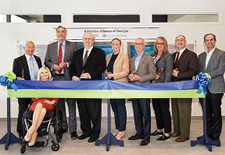 | | Addiction Alliance of Georgia opens treatment center | Two years after launching the Addiction Alliance of Georgia, partners Emory Healthcare and the Hazelden Betty Ford Foundation celebrated the official opening of the Emory Addiction Center. Made possible by almost $10 million in donations from public and private community partners, the center advances the goal of confronting the state’s addiction and overdose epidemic through addiction-related clinical care, education, and research. The center, located at Wesley Woods, offers outpatient and intensive-outpatient addiction treatment and co-occurring mental health care for adolescents and adults. Read more.
| | |
| | | 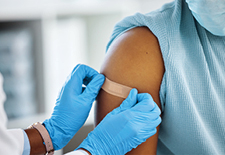 | | Why do vaccine responses vary? | Many factors determine whether an individual will generate an effective response to a vaccine, including specific biomarkers within the immune system. Until now, however, there has been no evidence showing whether these factors were universal across a wide range of vaccines. New findings from a meta-analysis published in Nature Immunology examine the biological mechanisms responsible for why some people’s immune systems respond differently to vaccinations. Emory researchers found study participants who had the highest levels of inflammation prior to vaccine had the strongest antibody response. Read more.
| | |
|
| |
|  | | Racial, ethic disparities in bystander CPR | Black and Hispanic people are significantly less likely than White people to receive potentially lifesaving bystander cardiopulmonary resuscitation (CPR) during cardiac arrest. That is the finding, published in the New England Journal of Medicine, of a review of six years’ worth of national data collected by the SOM Cardiac Arrest Registry for Enhanced Survival. The disparity between response for Black and Hispanic individuals versus White individuals remained consistent regardless of neighborhood income level or racial and ethnic makeup. The inequity was consistent even in public areas that might have had a larger pool of layperson responders with CPR training available, such as recreational facilities and public transportation hubs. Read more.
| | |
| | | 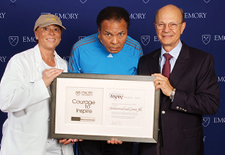 | | Muhammad Ali’s neurologists provide evidence for primary Parkinson’s diagnosis | Questions have long swirled about the extent to which Parkinson’s disease versus repeated hits to the head contributed to Muhammad Ali’s progressive tremor and cognitive impairment. Now, three neurologists who provided direct care to the boxing legend describe evidence in a JAMA Neurology Viewpoint supporting a primary diagnosis of young-onset Parkinson’s disease over a form of dementia from repetitive head trauma. In wishes expressed before his death at age 74 in June 2016, Ali declined an autopsy, so there was no post-mortem tissue diagnosis. But in the new article, physicians who treated Ali for more than 20 years at Emory, including Mahlon R. DeLong, professor emeritus of neurology, provide clear evidence to support a primary diagnosis of young-onset idiopathic Parkinson’s disease. Pictured above: Muhammad Ali and his wife, Lonnie Ali, with Mahlon DeLong. Read more.
| | |
|
| |
| 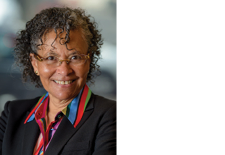 | | Camara Phyllis Jones elected to NAM | The National Academy of Medicine (NAM) has elected Camara Phyllis Jones to its elite 2022 class, consisting of 100 members. Jones is a family physician, epidemiologist, and past president of the American Public Health Association whose work focuses on naming, measuring and addressing the impacts of racism on the health and well-being of our nation and the world. She is an adjunct professor in the Departments of Behavioral, Social, and Health Education Sciences and Epidemiology at the Rollins School of Public Health (RSPH). She also is a senior fellow and adjunct associate professor at the Morehouse School of Medicine. Read more.
| | |
| | |  | | SON faculty win FNINR awards | A record number of faculty from the Nell Hodgson Woodruff School of Nursing (SON) have been named award winners by the Friends of the National Institute of Nursing Research (FNINR). The annual awards recognize national nursing research leaders who have made significant contributions to nursing science. Winning in four of the five award categories were (pictured l-r above): Linda McCauley, professor and dean; Sandra Dunbar, the Charles Howard Candler Professor; Deborah Bruner, senior vice president for research at Emory and the Robert W. Woodruff Chair in Nursing; and Eun-Ok Im, senior associate dean for research and innovation and the Edith Folsom Honeycutt Endowed Chair. Read more.
| | |
|
| |
| 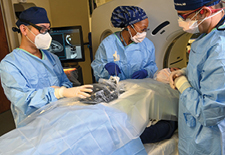 | | First in region to use novel robotic system to improve cancer detection | Emory Healthcare is the first in the Southeast to employ a novel comprehensive robotic system for interventional radiology procedures that guides physicians toward suspected cancerous growths much sooner and more accurately than ever before. By augmenting its interventional radiology and oncology suites at Emory University Hospital with the XACT ACE Robotic System, Emory Healthcare interventional radiologists can access both smaller cancerous growths and growths in difficult-to-reach places inside the body. Read more.
| | |
| | |  | | Targeted therapy reduces relapse for pediatric high-risk Hodgkin lymphoma | A targeted therapy for children with high-risk Hodgkin lymphoma was shown to significantly reduce relapse rates when tested in a large multicenter clinical trial conducted by the Children’s Oncology Group and led by pediatric oncologists at Winship, Children’s Healthcare of Atlanta, and Roswell Park Comprehensive Cancer Center. By combining the targeted antibody-drug conjugate brentuximab vedotin with the standard chemotherapy regimen, children were 10 percent less likely to relapse. The findings were published in the New England Journal of Medicine. Read more.
| | |
|
| |
|  | | Kelley Named Associate Dean for Research, Emory at Grady | Colleen Kelley, associate professor of medicine, is the SOM’s first associate dean for research for Emory at Grady. Kelley will provide leadership and serve as the point person for research partnerships between the SOM, Grady Health System, Morehouse School of Medicine, and other stakeholders. She will also lead strategic planning and implementation to enhance research-related operations and facilities on the Grady campus.
| | |
| | | 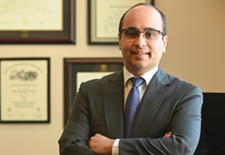 | | Saindane Named Chair of Radiology and Imaging Sciences | Amit Saindane, professor of radiology and imaging sciences, has been named chair of the Department of Radiology and Imaging Sciences after serving as interim chair since January 1, 2022. Saindane has a secondary appointment in neurosurgery and has previously served in key departmental roles including as vice chair of clinical affairs and director of the division of neuroradiology.
| | |
|
| |
| 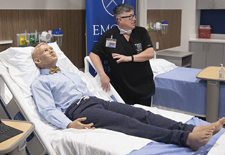 | | World’s first robotic patient simulator with AI capabilities installed at SON | HAL S5301, the world's most advanced interdisciplinary patient simulator, has been installed in the SON’s new Emory Nursing Learning Center. HAL S5301—known as Emory HAL—features conversational speech, life-like motor movement, and next-generation simulated physiology to mimic stroke symptoms and other medical conditions, giving students a more realistic experience. "Because of Emory HAL's engineering and artificial intelligence capabilities, he can process information and respond to learners much more organically during simulations," said Mena Khan, director of operations for the simulation program. "Our students will be even better prepared for nursing care and leadership roles because of their work with Emory HAL." Read more.
| | |
| | | |
| |
| 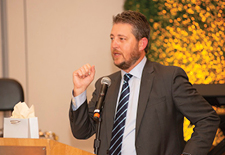 | | Owens elected chair of GHA Board of Trustees | Dan Owens, CEO of Emory University Hospital Midtown, was installed as chair of the Board of Trustees of the Georgia Hospital Association (GHA) on Nov. 10. Owens, who has served on the GHA Board since 2017, will lead the Board in developing strategies for GHA hospital members, advocating for the highest quality care for patients and supporting adequate reimbursement for hospitals. Read more.
| | |
| | |  | | Lillian Carter Center names assistant director for global research | The Lillian Carter Center for Global Health and Social Responsibility, which is part of the SON, has named Jacob Kariuki assistant director for global health research. In this role, Kariuki will help set the strategic direction of the center, which seeks to improve the health of vulnerable people worldwide through nursing education, research, practice, and policy. Read more.
| | |
|
| |
| |  | | Marilane Bond, associate dean for medical education, received the AAMC 2022 Group on Resident Affairs Outstanding Service Award, which recognizes an individual who exemplifies excellence and collegiality and has made innovative contributions over a significant time period.
Stephanie Eick, assistant professor of environmental health, was selected for the JPB Environmental Health Fellowship program, facilitated by Harvard University.
Maura George, associate professor of medicine, was selected to receive the 2022 Arnold P. Gold Foundation Humanism in Medicine Award, which honors a medical school faculty physician who exemplifies the qualities of a caring and compassionate mentor in the teaching and advising of medical students.
Reshma Jagsi, incoming chair of the Department of Radiation Oncology, has received a 2022 Meridian Award from the Association for Women in Science, which recognizes a mid-career professional whose diversity and inclusion efforts demonstrate leadership in the pursuit of workplace equity.
Marc Overcash, deputy chief information officer, received AAMC 2022 Group on Information Resources Vince Sheehan Service Award, which recognizes significant and long-lasting impact in the field of academic medical center information technology.
Sagar Patel, assistant professor of radiation oncology, has received the 2022 Joel Holsinger Young Investigator Award from the Prostate Cancer Foundation. | |
| |
|

